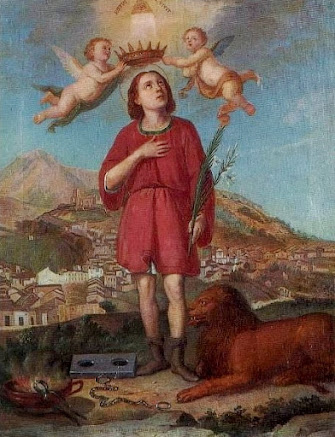 |
| “St. Justin, Martyr, Patron of the Destitute” from an antique holy card, artist and date are unknown |
what I have seen, I will describe.
At God’s word were his works brought into being;
they do his will as he has ordained for them.
As the rising sun is clear to all,
so the glory of the LORD fills all his works;
Yet even God’s holy ones must fail
in recounting the wonders of the LORD,
Though God has given these, his hosts, the strength
to stand firm before his glory.
He plumbs the depths and penetrates the heart;
their innermost being he understands.
The Most High possesses all knowledge,
and sees from of old the things that are to come:
He makes known the past and the future,
and reveals the deepest secrets.
No understanding does he lack;
no single thing escapes him.
Perennial is his almighty wisdom;
he is from all eternity one and the same,
With nothing added, nothing taken away;
no need of a counselor for him!
How beautiful are all his works!
even to the spark and fleeting vision!
The universe lives and abides forever;
to meet each need, each creature is preserved.
All of them differ, one from another,
yet none of them has he made in vain,
For each in turn, as it comes, is good;
can one ever see enough of their splendor?
-------------------------------------------
Commentary on Sir 42:15-25
Responsorial Psalm: Psalm 33:2-3, 4-5, 6-7, 8-9
with the ten-stringed lyre chant his praises.
Sing to him a new song;
pluck the strings skillfully, with shouts of gladness.
R. By the word of the Lord the heavens were made.
For upright is the word of the LORD
and all his works are trustworthy.
He loves justice and right;
of the kindness of the LORD the earth is full.
R. By the word of the Lord the heavens were made.
By the word of the Lord the heavens were made;
by the breath of his mouth all their host.
He gathers the waters of the sea as in a flask;
in cellars he confines the deep.
R. By the word of the Lord the heavens were made.
Let all the earth fear the Lord;
let all who dwell in the world revere him.
For he spoke, and it was made;
he commanded, and it stood forth.
R. By the word of the Lord the heavens were made.
-------------------------------------------
Commentary on Ps 33:2-3, 4-5, 6-7, 8-9
-------------------------------------------
Gospel: Mark 10:46-52
Bartimaeus, a blind man, the son of Timaeus,
sat by the roadside begging.
On hearing that it was Jesus of Nazareth,
he began to cry out and say,
“Jesus, son of David, have pity on me.”
And many rebuked him, telling him to be silent.
But he kept calling out all the more, “Son of David, have pity on me.”
Jesus stopped and said, “Call him.”
So they called the blind man, saying to him,
“Take courage; get up, Jesus is calling you.”
He threw aside his cloak, sprang up, and came to Jesus.
Jesus said to him in reply, “What do you want me to do for you?”
The blind man replied to him, “Master, I want to see.”
Jesus told him, ‘Go your way; your faith has saved you.”
Immediately he received his sight
and followed him on the way.
-------------------------------------------
Commentary on Mk 10:46-52
-------------------------------------------
Reflection:
[1] The picture is “St. Justin, Martyr, Patron of the Destitute” from an antique holy card, artist and date are unknown.
[2] S.S. Commemoratio
[3] The readings are taken from the New American Bible, with the exception of the psalm and its response which were developed by the International Committee for English in Liturgy (ICEL). This republication is not authorized by USCCB and is for private use only.
[4] The Navarre Bible: “Wisdom Books,” Scepter Publishers, Princeton, NJ, © 2003, p. 523.
No comments:
Post a Comment